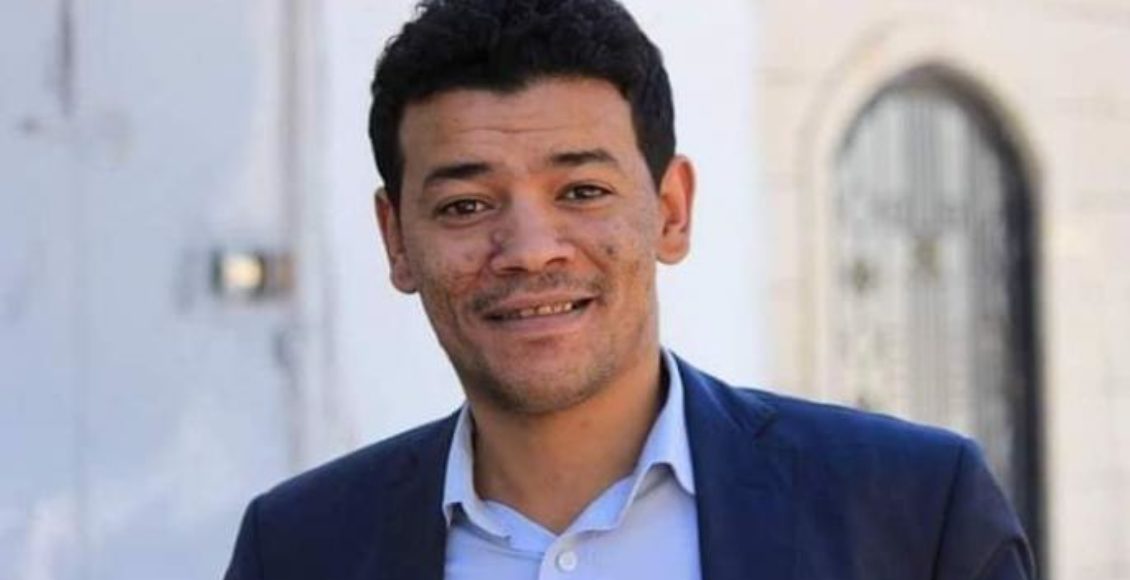
The disappearance of the case file of the journalist Mohammed Al-Absi from the prosecution in Sana’a
Report context February 2, 2023
Free Media
Six years after the assassination of investigative journalist Mohammed Abdo al-Absi, the perpetrators and masterminds of the assassination are still outside the circle of accountability and punishment, and the most dangerous thing is that his case file disappeared in the corridors of west of Sana’a prosecution, according to defense lawyers.
On December 20, 2016, the press community horrified by the death of Mohammed Abdo al-Absi in the Yemeni capital, Sana’a (northern Yemen), after a busy career in investigative journalism, during which he pursued many corruption topics risking his life that was eventually taken away from him.
That night, Al-Absi ate dinner outside with one of his friends, and after returning home, he was not normal, as confirmed by activist Qbool Al-Absi, the journalist’s sister: “He was sweating unusually in the severe winter cold in Sana’a,” and moments after entering his room, “we heard his wife screaming , so we rushed to his room and saw him convulsive, and his eyes were open, we tried to help him but he did not respond to us.”
“A lot of yellow foam was coming out of his mouth , and we couldn’t carry him without help, because his body had become heavier, and when we arrived at the hospital near the house, his body was blue, and the doctor told us that he had died,” al-Absi said.
Al-Absi’s family doubted that the death was not nutural, so they refused to bury him, and indeed, it turned out that Al-Absi was subjected to a deliberate assassination, as he died of poisoning, according to the coroner’s report issued on February 2, 2017, after sending a sample of Mohammed’s blood for examination in the Jordanian capital, Amman, where the examination showed that the journalist’s blood contained 67% carboxyhemoglobin, which is enough amount for death.
Therefore his family chose to go to justice and ask for a criminal investigation. They got what they wanted but in another crime, the case file disappeared in the corridors of the West Secretariat Prosecution in Sana’a six years after the assassination, and the investigation was suspended.
One of the defense lawyers team (we refrain mentioning his name for security reasons) confirms that in 2022 he and the family were informally informed that the prosecution issued a decision to save the case file for lack of evidence, “. As a result, we submitted a request to the prosecutor asking for a copy of the decision so we could take measures to appeal it. We got contradictory statements from the authorities, some deny issuing any decision in the case and others state that the case file does not exist in the first place.”
He says that the judicial authorities dealt with the case of Al-Absi with a kind of indifference, pointing out that the case file continued in the collecting evidence stage in the Criminal Investigation Department for three years, and that the case was subjected to procrastination in legal procedures and summoning the first suspects to appear before it. He adds that after another three years of referring the file to the prosecution, no action was taken, despite submitting requests to fulfill some of the shortcomings of prosecutor Abdul Salam Al Dhaheri, who quitted the case file.
In explaining the judicial development of the case, he says, “There is a deliberate suspension of the case by the authorities as a result of pressure from some influential people,” considering the disappearance of a murder case file in the corridors of the prosecution “a dangerous precedent in the history of the Yemeni judiciary.” In addition to compelling evidence that al-Absi died of poisoning, as the sample examination in Jordan showed, the case file contains leads confirming the involvement of people close to the Houthi group whose names were mentioned in the file, ‘but we could not reach them because of their power ‘.
But to understand this case well, and why many lawyers are afraid to plead and defend Al-Absi’s right, it is necessary to return to the investigative journalistic career of Alabsi. And the important issues that he tried to uncover.
Mohammed and investigative journalism
Human rights activist, Ammar Al-Sawai, one of Al-Absi’s friends, told Free Media: ” for a decade and a half of his journalistic life, Al-Absi focused on two main topics: the file of energy sold and the file of oil and liquefied gas, and the latter is considered the file of the conflict since the seventies of the last century until today, and in 2011 he added to his list of interests the file of the wounded of the revolution.”
Al-Sawai added: Until before the outbreak of war in late 2014, Al-Absi was a terror for one of the most important oil and gas companies in the world: «French Total company » He made a series of in-depth reports on corruption deals between this company and government influencers in the former regime. He also worked on publishing files proving the involvement of the government of former Yemeni President Ali Saleh. At that time the government made a deal to sell gas to the South Korean government at low prices in exchange for personal privileges and commissions, and in 2010 he founded Al-Absi «National Alliance against the liquefied gas Deal and Suspicious Deals”.
His activity before the assassination
In 2015, leaders of the Houthi group, called Ansar Allah, started as new players in the oil and gas sector. Journalist Mohammed Al-Absi continued to track the corruption of this sector, highlighting the use of oil in the policy of the war economy in favor of the Houthis.
The report of the Panel of Experts on Yemen submitted to the President of the UN Security Council on January 25, 2019, indicates that Mohammed al-Absi was working on an investigation into the Houthi leaders’ ownership of giant oil companies through which oil is imported, and that the revenues represent a huge resource for them.
In mid-February 2019, the UN Security Council’s Panel of Experts on Yemen reported that it had noticed that a murder crime happened. Journalist Mohammed Abdo al-Absi, who was investigating the financial activity of Ansar Allah (Houthi) leaders was its victim.
Journalist Fikri Qassem, a member of the board of directors of the Yemeni Journalists Syndicate, told Free Media that before his assassination, Al-Absi tended to publish stories about the Houthis’ corruption in the oil sector and their establishment of the black market after they broke into Sanaa in late 2014
Qassem explained that Al-Absi was unaware of the danger of addressing topics affecting the economic file of the Houthi group, stressing that Al-Absi was working on investigations into the involvement of the most senior Houthi leader Mohammed Abdul Salam in the file of oil corruption in Yemen. He got many documents and information from his extensive network of sources, including businessman and investor in the field of oil, Ammar Tawfiq Abdul Rahim.
Qassem pointed out that Al-Absi was communicating with Ammar Tawfiq to get some documents. When the Houthi group arrested the businessman, Al-Absi did not know at first about it and continued to send messages that were going to the Houthis. The Houthis knew what the journalist wanted, what he planned and what his next investigation was.
Al-Absi began to feel threatened, so he tried to communicate with a number of his journalist friends, says journalist Wedad Al-Badawi, who met Al-Absi in Sana’a, before his assassination, “I found him scared as he told me that the source who provides him with information and documents, was arrested, and that the party that arrested him saw the messages and communications between them”.
After that, Al-Absi received a series of threats, through social media and through direct calls. One day the glass of his car was smashed in front of his house. Al-Absi understood the seriousness of those threats, and stopped direct publishing corruption documents in the oil sector, through his personal blog, and began to work on leaking them through journalists and politicians outside the areas controlled by the Houthi group. Al-Absi had of about 30 thousand documents revealing corruption in multiple files, most notably the energy and oil file, as he told Ammar Al-Sawai when he advised him to stop publishing and leaking the documents. He also told Ammar that he was arranging to leave Sana’a, but days after this conversation, Ammar was surprised by the news of his death, as he says.
Obstruction
In a seven-year war, journalists have paid a heavy bill across the country, and activist Olfat Youssef, coordinator of the “Free Voices” project, which is implemented by the Free Media Center for Investigative Journalism, and documents the top 100 violations against journalists, says that the project team monitored 27 killings against journalists in three Yemeni governorates (Taiz, Sana’a, and Aden), including 12 planned assassinations, and 15 killings that were directly targeting journalists while covering the armed conflict.
Ms. Youssef confirmed that 17 of these cases have never been investigated by law enforcement institutions and public prosecutions, 8 cases are stalled in the evidence collection stage, and only two cases in which the trial is ongoing, the first is in Aden, south of the country, where the Sira court convicted the accused of killing blogger Omar Bataweel, who was assassinated in Aden in April 2016, although the court did not convict the masterminds behind the assassination. The second is in Taiz, where the West Court in Taiz governorate is still holding sessions to decide a verdict on the assassination of the independent journalist Fawaz Al-Wafi.
In all cases, perpetrators remain free without accountability to deter crime, which has become a nightmare that threatens freedom of expression and the press in Yemen. As Ms. Youssef says.

